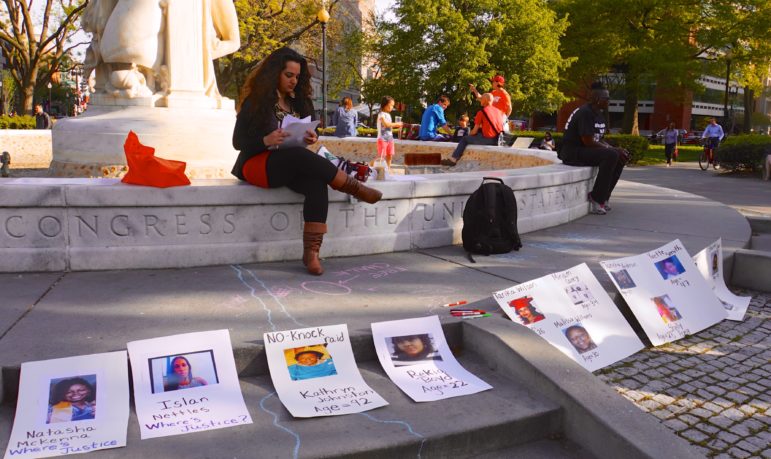
Ted Eytan
A vigil in Washington, D.C., for trans women who were victims of violence.
Later this term, the U.S. Supreme Court will take up the issue of bathroom rights for transgender people. The heated national debate, ostensibly over restroom access, reflects the extreme prejudice and hostility that transgender people face every day in America. And now the 2016 presidential election has served to compound the anxiety of the LGBTQ community. Several LGBTQ suicide hotlines have reported that since the Republican victory, the number of calls has risen dramatically from normal call traffic.
Statistics from the National Coalition of Anti-Violence Programs (NCAVP) offer a painful picture and validation of the community’s fears: hate-related homicides against LGBTQ and HIV-affected people increased 20 percent from 2014 to 2015; 62 percent of the victims were people of color and 67 percent were transgender and gender non-conforming people. By early October 2016, 20 transgender murders had been recorded, including those of 16 trans women, almost all persons of color. And let us not forget the horrific massacre in June at Pulse Nightclub in Orlando, whose advertisements featured trans women, a daunting example of the ingrained and brutal hatred that exists for the LGBTQ community.
No one is more at risk than a trans woman of color, even here in New York. A female transgender inmate who was housed in a male jail on Rikers Island is now suing the City, saying that guards stood by and did nothing while she was bullied, punched and beaten by fellow prisoners over her gender identity and sexual orientation.
It’s time we affirm the lives of trans women and include them across advocacy, services and funding for women. That is why at the New York Women’s Foundation, when we say we invest in the lives of women, we mean all women, including trans women. We focus on our mutual concerns, challenges and strengths. Our mission — to improve the lives of women and girls by promoting economic justice, lives free from violence, and health, sexual and reproductive rights — includes assisting those who are transgender.
Our transgender sisters are among the most vulnerable of our sex. Trans women are four times more likely to live in poverty. They are more likely be bullied, harassed, discriminated against and be physically and/or sexually assaulted. They also are more likely to attempt suicide. They need our help.
One reason so many transgender women live in poverty is because of the prejudice and exclusion they face gaining employment and navigating the working world as a gender-nonconforming person. New York is a leader in this area having made great strides in legal protections for LGBTQ individuals. In most states, employers do not have to provide legal protections for LGBTQ employees, meaning employees can be fired just for being transgender.
Accessing affordable quality healthcare is a major challenge for trans women because of their unique needs; there are too few specialists in this area of medicine. In addition, the exorbitant cost and discrimination from health insurance providers fuels the problem. According to the Human Rights Campaign, out of 636 U.S. companies analyzed, in 2012 less than a third provided healthcare coverage to transgender employees. While that is a great leap ahead from 2009 when only seven percent of corporations offered coverage, there is so much further to go.
At the New York Women’s Foundation our inclusive approach means investing in a range of community-based LGBTQ organizations ready with solutions. In doing so, we have become the tenth largest funder of trans-led organizations in the United States. Recent grantee partners include organizations such as the Callen-Lorde Community Health Center, a provider of quality healthcare, health education and wellness targeted to New York’s lesbian, gay, bisexual and transgender community.
Other transgender advocacy programs we support include anti-violence organizations and a pioneering detainee empowerment project that assists LGBTQ people coming out of immigration detention. The Queer Detainee Empowerment Project provides guidance and assistance for the most at-risk members of the transgender community: LGBTQ undocumented and detainee people who usually re-enter society jobless and in financial need.
Centering the voices and perspectives of youth is critical, which is why we support groups such as FIERCE!, an LGBTQ youth of color organization cultivating social justice movement leaders dedicated to ending all forms of oppression and the Hetrick-Martin Institute, a safe haven offering academic assistance, job-readiness training, arts and culture programing, counseling and even meals to hungry LGBTQ youth.
Trans women and girls have the same right to live safely, be economically secure and have access to gender competent healthcare as any other women and girls. On this November 20th, Transgender Day of Remembrance, let us remember that support by women’s organizations means everything and when we include assistance to trans women in our mission, we fight against gender discrimination in all its forms.
Ana Oliveira is President & CEO of The New York Women’s Foundation.









2 thoughts on “CityViews: Trans Women Need Public Resources, Not Just Victim Remembrance”
“Trans Women Need Public Resources”
BS. You make your own bed, you lay in it.
Rick, please explain: Are you suggesting that if someone’s gender identity clashes with traditional norms, that they deserve to be victims of violence?